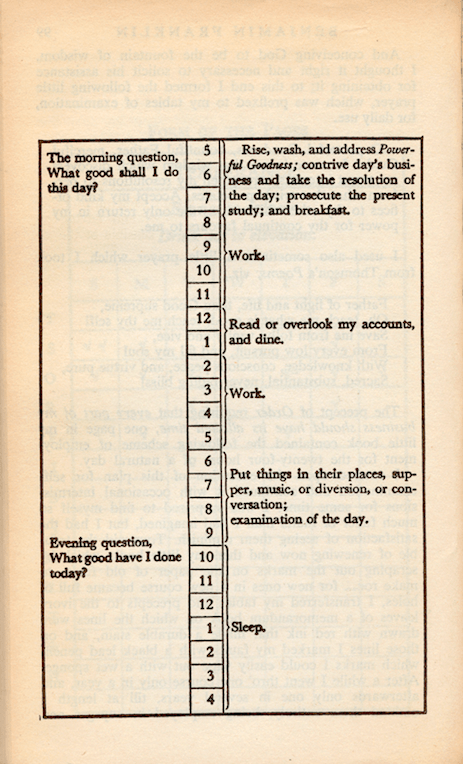
We like to see our forefathers as these mythical superheroes who were larger than life and accomplished more than we are capable of ourselves. Fact is, they’re just simple men and women, like us, who ate, slept, pooped, and thought, just like we do. One such man, Benjamin Franklin (the old guy on the $50 bill), kept a documented daily schedule which you can view below:

Shoot, I left off, “Dispose of hooker in trunk…”
Benjamin Franklin’s schedule teaches us a lot of valuable lessons. Here are a few things you can learn from this founding father’s routine:
This is Benjamin Franklin’s actual daily routine. This is how he lived his life every day. Whether inventing bifocals, freeing the American colonies, or negotiating with foreign diplomats, Franklin followed the same routine as often as possible. This steady regimen provided the balance necessary in his life to accomplish all of those other great things we read about, and praise. If you aspire to have your praises sung like Benji, you need to find a balance.
Money and time are resources you spend to accomplish things in life; you spend one, the other, or both. Understand, however, that you must budget both. Your budget needs to be tangible and in your face. Remember when deciding whether to spend time or money that it took you time to earn that money. Your time budget, or how you allocate the hours in each day, is much more important than your financial one. Plan accordingly.
You’ll notice nothing in Franklin’s schedule is job-specific; you can’t even tell what he does for a living. He drafted a simple schedule that any human being can follow. Even if you can’t hit the same hours because of work, family, and other obligations, you can simply shift the hours in the schedule. The point is to ensure a separation of work and self that’s much more important than church and State.
Nearly everything on Franklin’s list is selfish. The foundation of his daily schedule is himself. It’s only after he takes care of himself that he focuses on work and doing a good deed for others. If you’re not taking care of yourself, you’re likely not doing as much good as you think. You can’t disconnect from yourself, so make sure you keep you up and running at all times.
I know there are bills, stress, work, school, annoying bosses, coworkers, classmates, traffic, lines, and blah blah blah. I get it; it’s not like I live is some alternate reality that’s completely separate from you and your life. I’m 33, have no car, and sleep on a floor. I still smile because life really is easy. It takes hard work, but I treat my life like Ben Franklin does. By shifting my focus, I don’t think about the days I walk 20 miles or stay in bed because I don’t have much enough money to buy food. No matter what’s happening in my life, coping and succeeding are both a matter of routine.
I hear a lot of people say, “you learn something new every day,” when surprised by some random new fact. This always made me chuckle, because those people don’t say that every day. In reality, they’re learning something new 3-5 days a month. Benjamin Franklin made a goal to learn something new every day, and he didn’t even have the Internet. Whether at school, home, work, or through friends, you have access to the combined knowledge of the human race at your fingertips. You should be learning 1000 new things a day, minimum.
Budgeting your time and money is important, and organizing where everything goes is essential to sticking with that budget. At the end of every day, Ben Franklin put his toys back in their box, just like your mom made you do as a kid. This is because a messy work space is counterintuitive to actual work. When you keep your things organized, you feel less flustered, and you’re less likely to make impulsive decisions.
Question everything; just don’t overthink yourself or you’ll end up never doing anything. Franklin asked himself every evening whether or not he accomplished his goals. By keeping track, he holds himself responsible. There are no excuses. Be accountable for your goals. The cigarette you sneak, the candy bar you don’t tell people in your Zumba class about, it’s all hurting yourself and no one else. If even you won’t listen to you, who else will?
Plans are essential to accomplishments, and Franklin’s schedule is the perfect plan. It’s detailed enough to begin following as a guide, yet basic enough to be easily adapted to a variety of situations and scenarios you’ll likely find yourself facing in real life. You never know what life will hand you. Don’t be so rigid in your plans that you do nothing, but have one like Franklin’s, so no matter what happens, you have a point to start over from.
Katie McCarthy has an amazing podcast called Give Good; in it, she profiles people who dedicate their lives to enriching the lives of others by seeking justice, providing charity, and helping others that need it. Listening to the podcast is a great way to see what others around the world are doing to contribute good deeds to the world. If you want to use Benjamin Franklin’s daily schedule as your own, and I highly recommend you do, find a way to do something meaningful for someone else.